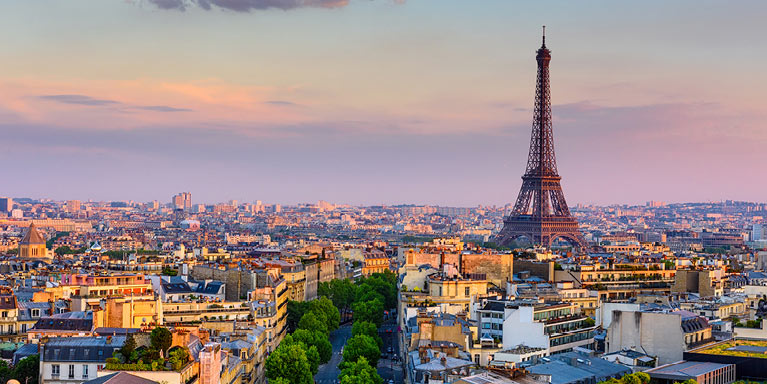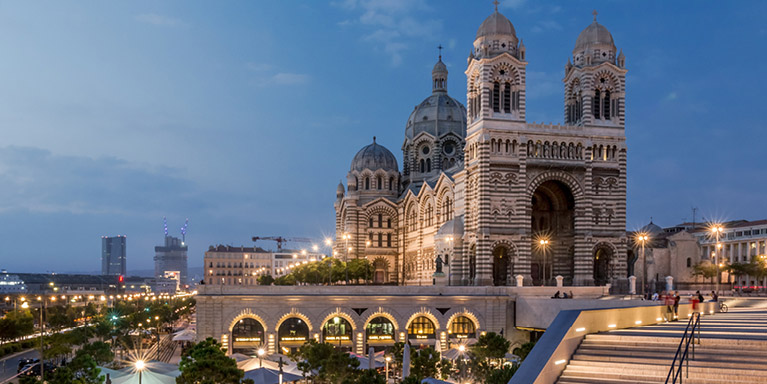
A guide to France
Our expert view on expat life in a country rich in culture

Whether you prefer fast-paced cities, skiing in the Alps or soaking up the Mediterranean sun, France has something for everyone. It’s home to some of the world’s most famous art, recognisable landmarks and most prestigious fashion brands. The French are famously proud of their history, culture and cuisine, so prepare to learn the language and integrate into the community.
France offers expats a great work-life balance and property is relatively affordable. It’s a good place to raise a family, with a wide range of leisure activities to keep the children entertained, an excellent standard of education and stable overall infrastructure.
In this guide, we’ll look at the things that are good to know to help you settle quickly into your new life. And, if you’re thinking of moving abroad, we’ll be by your side as you embark on your latest adventure.
- Population: Over 68 million
- Currency: Euro (EUR)
- Capital: Paris
- Biggest cities: Paris, Marseille, Lyon
- Main language: French
- Main religion: Christianity, also Islam and a smaller percentage of Judaism and Hindu
- Political system: Constitutional republic
- International dialling code: +33
- Emergency services: 112 (general), 17 (police), 15 (ambulance), 18 (fire)
- Driving: On the right
-
Careers
France’s main industries are agriculture, fashion and tourism – with Paris at the centre of the last two. In fact, Paris has one of the largest urban economies in Europe. Business is heavily regulated by the government, but it does provide a good legal framework to protect and encourage investors.
Paris is host to numerous multinational companies, and Lyon also has numerous chemical plants and research facilities, as well as the headquarters of Interpol, so hosts a lot of international conferences. Earning potential for expats in France is broadly in line with the rest of Western Europe.
The business structures are hierarchical – interactions are formal, especially in the beginning, but debate and deliberation are encouraged, and women have equal opportunities.
The French value being smart and punctual. Work and personal lives are usually kept separate, but if you are invited to someone’s home take a small gift to show your appreciation (flowers or chocolates, for example).
A light handshake is the most common business greeting for both men and women. Friends and close colleagues may kiss on one or both cheeks. It’s polite to address people by ‘Madame’ or ‘Monsieur’ or title and surname if you know them.
Business hours are usually from 8.30am to 5.30pm, Monday to Friday, with a standard 35-hour working week. English is rarely spoken, so you’ll need to learn French up to a reasonable level.
Education
Schools are excellent in France, but very strict. Teachers demand respect from students and parents, so don’t appreciate anyone challenging their authority or domain. The academic year runs from September to July with the main holidays in July/August and February/March. School is compulsory for children aged between 3 and 16 and runs Monday to Friday. However, primary school children only attend school for half a day on Wednesday mornings, so it is important to remember to factor this into your working hours or seek childcare.
The state provides free education for all residents, based on catchment area, and follow the national curriculum. It’s a good option for learning French and making friends with other children who live nearby. There are some private schools, often based on religion, that also follow the same curriculum and aren’t too expensive. Most of the major cities – particularly Paris, Nice and Lyon – have excellent international schools, which teach the International Baccalaureate. Waiting lists can be long and the fees vary but are generally quite high.
-
Moving money
Putting the right banking arrangements in place is vital for expats around the world. You want to be able to access and transfer money easily, and with a bank you can trust to comply with international regulations. Most people have two banks – one in their home country and one local to where they’re living. But, if your bank has a global network, you may be able to set up an account ahead of your arrival, which gives you time to assess the financial market.
It’s important to understand how foreign exchange works and how fluctuating exchange rates can affect you. When you’re juggling finances in multiple currencies, remember that the currency markets can move quickly and make a big difference to the value of your money.
To help you reduce the risk of fluctuating currency, you could choose a foreign exchange that lets you fix an exchange rate for a fixed period. Then you’ll know exactly how much you need to convert, whatever happens in the market.
Budgeting
When you’re looking to move to a new country, you need to consider how a change in the cost of living could affect your finances. If you’re moving with your job, sometimes your employer may help with expenses, such as accommodation or school fees. Remember to account for setup costs, such as buying furniture and sorting insurance, when you’re thinking about your budget.
Costs
Some of our offshore accounts have a monthly fee, such as the International Current Account, whereas others, like the Premier International Account, don’t. Both offer fee free International Payments and 24/7 worldwide access, plus the Premier also includes worldwide travel insurance for you and your family. Terms and conditions apply.
Financial planning
While it’s going to be a busy time, it’s also worth setting some time aside to review your financial plans, such as whether you want to open any offshore accounts. They offer the convenience of keeping your money in one place so you can stay with the same bank no matter where life takes you.
Your expat status could give you new opportunities that weren’t available to you at home. However, tax rules differ from country to country, so if you’re unsure about your personal tax obligations, you should seek professional advice.
Lloyds Bank International Private Banking is by your side every step of the journey as you start your new life abroad. We offer international knowledge, experience and dedicated expert support to help meet all your financial needs. From savings to international payments and transfers, we can help you navigate the complex world of wealth management away from home.
Security
Offshore accounts are not protected by the Financial Services Compensation Scheme (FSCS), which protects savings up to £120,000 with authorised UK banks and building societies.
However, our accounts are covered by other schemes. The Jersey Bank Depositor Compensation Scheme, the Isle of Man Depositors’ Compensation Scheme and the Guernsey Banking Deposit Compensation Scheme offer protection for eligible deposits of up to £50,000.
Tax
The tax year runs from 1 January to 31 December and the official deadline for filing is the end of the following February but can be extended in certain circumstances. Married couples must file a joint return for all types of income and report the status of any dependent children. Under the family coefficient system, the income brackets of tax rates are determined by dividing taxable income by the number of allowances available to an individual. The final tax liability is then calculated by multiplying the tax computed for one allowance by the number of allowances claimed.
High-income taxpayers are liable for an exceptional tax calculated on their gross taxable income at 3% or 4%.
Contribution sociale généralisée (CSG)/contribution reimboursement de la dette sociale (CRDS) applies to all resident taxpayers at a rate of 9.2% on 98.25% of gross salary if it does not exceed 164,544 EUR (2024) per year and on 100% of the portion of the gross salary above that ceiling, including benefits in kind and bonuses.
Individual income taxation is based on residence; however, non-residents’ tax liability may not be less than 20% of net taxable income for income between up to 26,070 EUR and 30% for income above that. However, if a non-resident can prove that the effective rate of tax computed on their worldwide income, according to French tax rules, is less than 20% or 30%, the progressive income tax rates apply without limitation. Taxable income consists of annual disposable income from all sources. Allowances, deductions and treaty provisions are applied in calculating net taxable income subject to these progressive tax rates.
In general, losses from one category can be used to offset profits from other categories and can be carried forward for up to six years. However, this is subject to limitations and don’t include capital losses on quoted stocks and bonds.
France has double tax treaties with 132 countries. If a double tax treaty does not apply, residents are generally allowed to deduct foreign taxes as an expense. However, double taxation is generally eliminated by a tax credit or by exemption with progression.
See www.impots.gouv.fr/accueil for further information.
Accommodation
Depending on where you’re based, there are plenty of options. If you’re in a city, it’s likely that you’ll opt for an apartment, whereas the countryside boasts large and affordable houses.
It can be difficult to rent ahead of your arrival, as most agents and landlords prefer to meet prospective tenants first. Many properties are sparse with no appliances or white goods included, so factor that into your calculations.
To secure a rental property, you’ll likely need proof of income, and evidence that your monthly salary is at least three times the rent. You’ll usually have to pay at least a month’s rent as deposit. It’s important that you carry out a full inspection with the agent and owner, noting any damage or cosmetic marks. Utilities should be included, but you’ll need to sort out home insurance and there’s an annual tax for the occupiers.
While property prices may seem reasonable, you need to factor in the additional bureaucratic costs as the housing market is highly regulated. There are still bargains to be had in the French countryside, so it’s worth considering if you intend to settle for the long term.
There’s a large rental market and it’s very competitive.
In 2023, the average rent price across the country was between 14 EUR and 35 EUR per square metre. A one or two-bedroom apartment in a French city apart from Paris cost 850 EUR to 1,500 EUR per month. In Paris that goes up to around 1,300 EUR for a one-bedroom apartment and over 2,000 EUR for larger places.
Thinking about location, the capital Paris is a large multicultural city where most well-paid jobs are to be found. Lyon is known as the gastronomical capital of France, steeped in history and within reasonable distance of the Alps if skiing is your passion. Nice has the sea and beautiful scenery, so is a popular destination for tourists and retirees. Around the Dordogne and the southwest, you’ll find pretty villages with affordable houses surrounded by scenic countryside.
Nearby Toulouse is the fourth-largest city in France and benefits from having some of the best schools and museums if you’re moving with a family. The old port city of Marseille is a cosmopolitan melting pot, with influences from around Europe and Africa. Montpellier has grown rapidly in the last century, in part due to its thriving student population, and has become a popular place to live.
Famous for food and wine, Bordeaux has a lot to recommend in terms of culture, architecture and history. It attracts expats from the aeronautics, military and space sector, as it’s home to numerous international companies. Lille is the capital of the Hauts-de-France region and has a strong Flemish influence. With a direct link to London through the Eurostar and other excellent transport links, including an international airport, it’s easy to get around Europe.
Arts
France is renowned for its art and every town will have galleries and exhibitions that are open all year. The most famous are in Paris: The Louvre has a collection of art from the 18th century and earlier; Musée d'Orsay, situated in an old railway station, boasts an impressive range of paintings from Impressionism and Fauvism movement; while modern art is represented at the Musée National d'Art Moderne in the Centre Pompidou.
The world of literature has flourished in France from Victor Hugo, Emile Zola and Alexandre Dumas in the 19th century to the world’s most famous philosophers in the 20th century (such as Camus, Cocteau, Proust and Sartre).
French cinema similarly has a proud history. Indeed, the Lumière Brothers are credited with creating cinema in 1895 and the tradition has continued to the present day, most notably with the Cannes Film Festival each year.
Culture
France is a secular country and the freedoms established during the French Revolution of 1789 are still highly valued. The French are very proud of their history, language and culture, so learning something about those will stand you in good stead. They are known to be forthright and value etiquette, so it’s important to get to grips with greetings such as when to offer a handshake or bisous (kissing both cheeks).
Food
The quality of the cuisine on offer is a joy to behold. From the record number of Michelin-starred restaurants (29 in 2023) to the local patisseries and boulangeries, each region will boast delicious dishes for you to enjoy, each with its own local variations. Almost every restaurant will offer an affordable, and usually plentiful, plat du jour (dish of the day).
France produces the most wine by value in the world. The wine regions in France are some of the oldest and most celebrated in the world – particularly, Bordeaux, Bourgogne and Champagne.”
Health
The healthcare in France is among the best in the world, with a high doctor-to-patient ratio and a global leader in medical research. Hospitals are clean and modern, with short waiting times, and have some of the leading specialists in Europe, if not the world.
It’s a universal service providing sufficient care for everyone, irrespective of wealth, age or social status. This is funded by the government through social security contributions.
However, by law, all residents must have some form of health insurance – state or private – but, if your household income falls below a certain threshold, you may be eligible for free health cover. Most expats have medical insurance, whether that comes as part of their job package or taken out independently. The average cost of health insurance in 2024 was 40 EUR (34 GBP or 44 USD) for one person per month.
Over-the-counter medications can only be sold in pharmacies, which are numerous and open late in the bigger towns and cities.
Medical emergencies are handled by SAMU (Service d'Aide Médicale d'Urgente), a public organisation that provides ambulances and other services.
Pets
You can bring most pets into France from other EU countries if they’re over three months old, are microchipped and have a rabies vaccination at least 21 days prior to travel. Dogs from high-risk rabies countries must also have a blood test on arrival and some ‘dangerous dogs’ are banned. If you have an EU-issued pet passport, this remains valid for travel. However, if you’re from outside the EU, you’ll need a health certificate signed by a vet from your home country.
Restricted items
Meat and milk products from non-EU countries are banned from import and anything made of ivory, tortoiseshell or coral. Otherwise, the list of prohibited items in France is fairly standard – guns, drugs, counterfeit goods, species-protected plants and animals.
Shipping
Shipping goods to France is relatively straightforward and hassle free due to its many ports, an extensive railway network and several international airports. You can import household goods and personal belongings duty free if they’re more than six months old. Air is the quickest way to get your personal effects into the country but can be expensive. It’s also worth checking what services are covered when you get quotes for importing, such as customs clearance, door-to-door delivery charges and unloading.
Transport
Transport in France is among the best in the world. The motorways are extensive and well maintained, in part due to the high tolls you pay. It could be worth getting a Telepeage that you put in your windscreen, which allows you to drive without the hassle of stopping then directly charges your debit card. Of course, if you have time to take in the scenery, you can avoid the tolls by planning your route in advance.
Parking in the larger cities can be difficult and expensive, but generally the space in France makes it easy and cheap or free in smaller towns and the countryside.
If you have an EU driving licence, it’s valid in France; but if you’re from outside the EU, you must have an international licence and convert it to a French licence within six months of arriving.
Public transport in France is also excellent. The train network connects all the main cities via the high-speed TGVs and extends into Belgium, Germany, Italy, Luxembourg and Spain, plus the Eurostar to England. You can buy a pass for a limited period if you intend to travel and explore the country and its neighbours. Buses, and trams in the bigger cities, are cheaper but slower and less comfortable. Air France offers both domestic and international flights, although being in Paris would probably only make that a practical option.
Lloyds International takes no responsibility for the accuracy of this information. It is provided for orientation purposes and to stimulate further research, not as advice. We advise that you independently verify any details and make decisions based on your own assessment. It is crucial you are aware of and comply with any relevant laws in your host country or country of origin.

Paris
The French capital is a large multicultural city with numerous opportunities for work – whether in tourism, gastronomy, fashion or commerce. Paris is known for its museums, galleries and famous landmarks, so there’s plenty to explore for people of all ages.

Marseille
Centred around the bustling old port, Marseille is a real melting pot of cultures from Europe and Africa. From its impressive architecture to the spectacular calanques, this cosmopolitan city offers an affordable Mediterranean lifestyle for people from around the world.